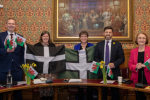Thank you Mr Deputy Speaker
I am grateful to have the opportunity to speak in this debate on Covid-19 coming from North Devon where we are known for our big waves, we have been fortunate to only have seen Covid ripples to date.
Devon and Cornwall have seen the lowest incidents of cases throughout the pandemic, and continue to be the safest place in the country with regards to the spread of the coronavirus. However, with an elderly population and numerous care homes, the risks if Covid-19 takes hold in our communities should not be underestimated.
I want to take this opportunity to thank the people of North Devon, and beyond in the south west, for their strict adherence to the rules. I also want to thank our businesses, who have implemented so many new procedures effectively, as has been seen by the huge numbers of tourists that have visited us in the south west, without an increase in cases.
We always have much to be thankful for living in North Devon, but the wide open spaces I talk of when here have given us much protection against Covid 19.
My constituency is 1086 sq km, approximately four times the size of Birmingham, and is home to just over 96,000 people – Birmingham is home to over a million. The population density of North Devon is just 88 people per square kilometre, compared to Birmingham’s 4055. This inevitably makes social distancing easier.
We have a distinct lack of public transport, which causes us no end of problems the rest of the time, but during this pandemic is also advantageous to the spread of the virus.
In highlighting the structural differences in North Devon as well as the very high compliance of the good people of North Devon I want to ensure that before any further restrictions are imposed these are widely understood. Rural Devon is a very different place to any of our cities. Our pubs are community hubs, holding pop up libraries, defibrillators and for many villages literally the last business remaining in the community. Our pubs are also smaller than most of their city counterparts, and our population older.
As we head into winter, the idea of spending cold, stormy nights at home, rather than with friendly faces by an open fire is daunting for many.
I hope these differences will be taken into account if further measures are considered, as I recognise concerns elsewhere that people travel to avoid restrictions, but again the lack of public transport makes it highly unlikely anyone will venture to North Devon for a later pint than a neighbouring city being over 50 miles away!
As and when we eventually get to unlock I hope that these differences will also be taken into consideration, not just in North Devon, but across much of the south west, and other rural parts of the country. Our economy is structurally far more vulnerable than cities with their wealth of different industries. We are very dependent on our tourism and hospitality industries and that is in my mind, in no small part why these businesses in North Devon have ensured the guidance is so strictly followed.
And it is against this backdrop of such low population density, and such high compliance, that I find it difficult to understand how according to the excellent new app, that the risk of Covid-19 in North Devon is the same as in highly populated parts of the country with infection rates more than 10 times our own.
I certainly do not want to do anything that puts the population of North Devon at increased risk, but by the same token, it is a fine example of how following the rules can lead to better outcomes and I hope that continues.
Understanding risk is critical to people being able to live something approaching a normal life as we wait for a vaccine against this dreadful virus. As the Chancellor said last week “we must learn to live with this virus and live without fear” and this can only be achieved if we are able to fully understand the risks we are living with.
I do fear how being assigned the same level of risk as such different parts of the country may impact on vulnerable residents who have lived in fear and often isolation for over 6 months already and hope that clearer guidance on assessing risk, and rewarding those communities who have seen such positive outcomes can be delivered.
I would also like to take this opportunity to say how disappointed I am at the approach currently undertaken by the opposition and the media with regards to university students and Christmas. Having been a teacher prior to my election last December, and been teaching A-level students in my mind it is vital that our young people are able to continue their education.
Although reluctant to confess to middle age, time does go at a different pace once you get there, compared to your teens and twenties when 2 weeks self-isolation is a lifetime, the perspective of years does condense the weeks somewhat. I have no doubt that we all want our families to be together this Christmas, but if the point we are at in the second wave does mirror the first wave of March this year, and we fail to suppress it, then come Christmas we will be seeing hundreds of deaths a day when we eventually get there in three months time.
I don’t believe anyone wants that. I think we should give more credit to our university students who I hope will be able to assess that risk themselves and if they want to return home this Christmas ensure that they are undergoing their studies in a Covid-compliant manner.
None of us wanted to live through a pandemic, but if we want our families as well as ourselves to live through it, we need to take heed of the guidance and better understand the risks.

